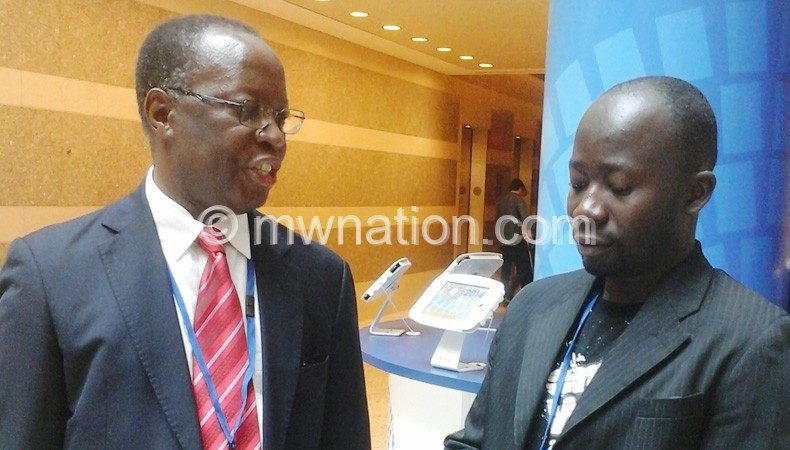Weakening Malawi kwacha not strange—Chuka
Reserve Bank of Malawi (RBM) Governor Charles Chuka has downplayed the buzz over the recent weakening of kwacha against other major foreign currencies.
The local currency has continued to lose ground in recent weeks, especially against to the dollar, trading around K440 from a rate of K390 mid this year. Some foreign exchange bureaus are even selling a dollar at K455, according to daily foreign exchange bureau rates published on RBM website October 7 2014.

Chuka said there is no need to worry and panic over the falling local unit as the country still has a narrow export base.
Speaking in an exclusive interview with Business News in Washington DC, USA on the sidelines of the International Monetary Fund (IMF), World Bank annual meetings last week, he said what is key is for local exporters to get the right price for their exports, adding that Malawians should not worry about the impact of a depreciating currency on consumers or traders.
“There is no news that the kwacha is depreciating, because we were expecting it anyway. The country still has not managed to diversify its sources of forex,” said Chuka.
“So, it should not be news to any Malawian, who is talking about it anyway? Ask the exporters how they feel now that the kwacha is depreciating.
“If exporters get the right price for their dollars, they can invest more in exports. If we continue to worry about consumers like you and me and traders, then we are missing the point.”
The ceding of the currency against other major currencies comes at a time the market for tobacco, which is Malawi’s major source of foreign exchange, has just closed, earning the country $362 million (K160 billion), almost the same amount realised last year from the crop.
Chuka explained that stories about donor inflows, one other key source of foreign exchange in Malawi, will still remain negative going forward as people are scared because “we do not have enough inflows that are coming in.”
The RBM boss, however, said it was imperative for Malawians to acknowledge that the economy is growing which translates into more demand for dollars.
“So despite the fact that donors have gone away, the country is growing,” said Chuka, adding: “And so it is requiring more and more imports; and imports are necessary to grow in fact.”
He said with the new exchange rate, the country is importing more raw materials and intermediate goods and other critical inputs.
He noted that the central bank’s data now shows that the structure of Malawi imports has changed, saying the country is importing more of industrial inputs.
“The problem is that we have not reached a point where we are producing more for exports and we need a bit of more time to produce exports because interest rates remain high.
“So until we have stabilised the economy and interest rates have come down, diversification of exports will still remain a huge problem. So we have more demand for foreign exchange than supply.”
He said presently, it is the flexibility of the exchange rate which is helping the central bank to balance the demand and supply of foreign exchange and help the bank hold enough reserves.
In August this year, the Economist Intelligence Unit (EIU) projected the local currency would average K422.78 against the dollar in 2014.
Last week, Nico Asset Managers noted that there are risks on the local currency emanating from the uncertainty on donor funds.
“Overall the kwacha will depreciate in the medium to long-term due to trade imbalances, current account deficits, low forex reserves and significant levels of imports,” said the investment advisory firm.






I am following this monetary situation very closely. It is at a very delicate stage. In the main what Chuka has discussed here is true. Malawians must not panic about the depreciation of the local currency. The exchange rate is going to continue on its a sinusoidal swings of ups and downs depending on the planting season. It is important that people do not speculate unnecessarily to damage confidence in the local currency. If you love your country as you should then it is incumbent upon you to do the right thing do not speculate! Nothing bad will happen to Malawi economy, its currency even if donors have withdrawn their support.
However, there is one dark cloud that in the interest of transparency must be brought to the public awareness. The reported disagreement or misalignment between Malawi and the IMF!!! That is playing with fire should this conflict escalate. Because this issue is so subtle and unbeknown to majority of people and yet it is so detrimental and fatalistic to the wellbeing of the whole economy. Finance and monetary authorities and politicians must not blink to let the IMF take an adverse action on the economy once again! IMF is one donor you do not mess with. This is the “donor” you do not want to withdraw from Malawi. The only one! so please in the interest of sound monetary, fiscal and economic policy, resolve this reported conflict with the IMF as a matter of urgency so the ECF can be resumed. Apart from the IMF threat, which depends on the political will to cooperate, the economy will continue “limping” as usual in the manner the governor has described.
My fundamental frustration about the Malawi economy is why have we not addressed these elementary sinusoidal swings, caused by anchoring the economy on seasonal agricultural output? Why are politicians in Malawi not taking up the cause for industrialisation to eliminates these seasonal swings and to create wealth for all our people?